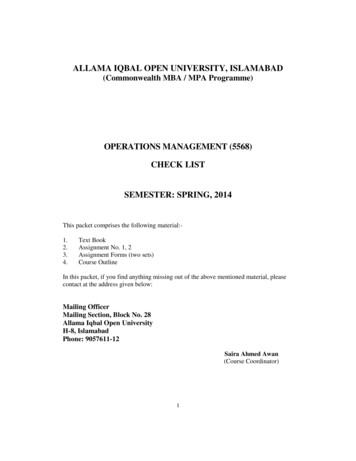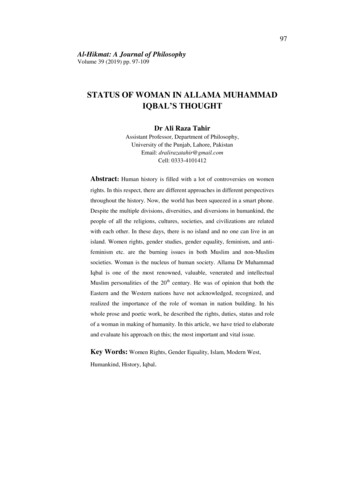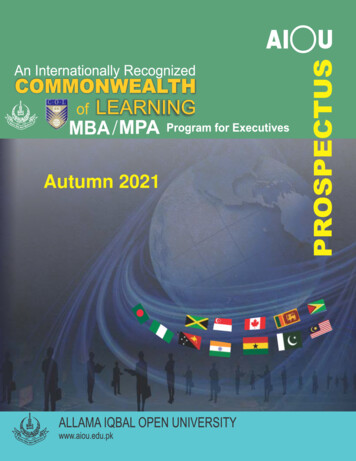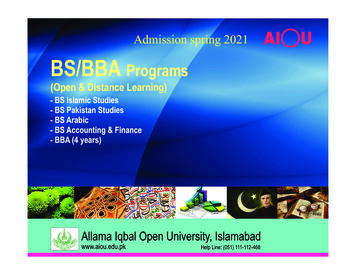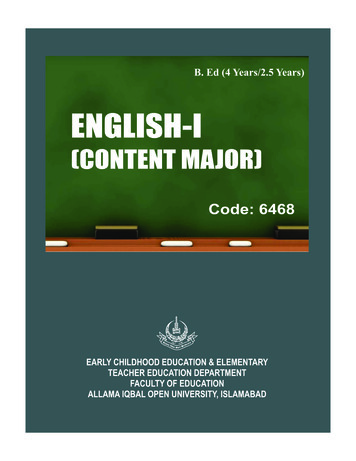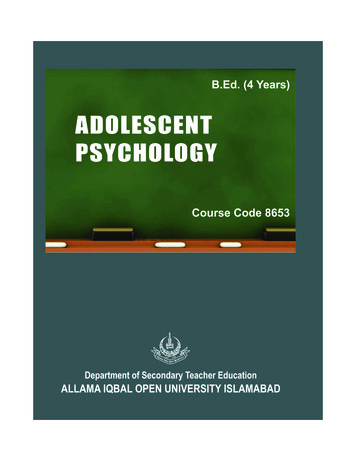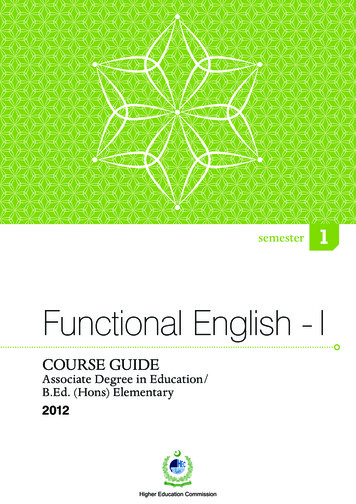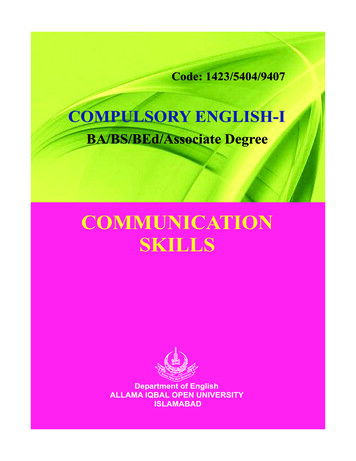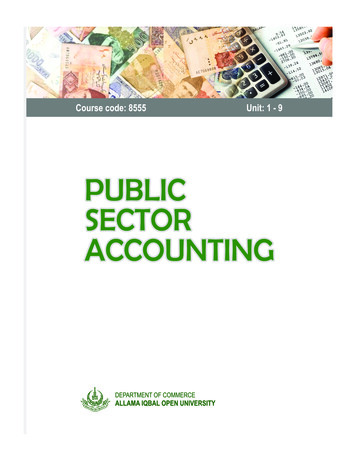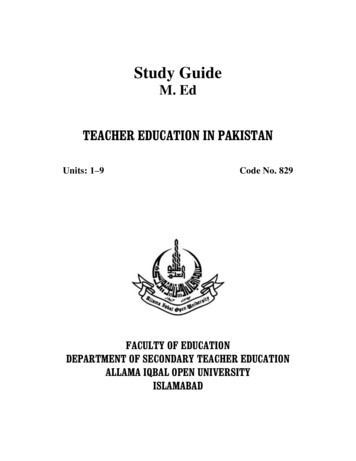
Transcription
Study GuideM. EdTEACHER EDUCATION IN PAKISTANUnits: 1–9Code No. 829FACULTY OF EDUCATIONDEPARTMENT OF SECONDARY TEACHER EDUCATIONALLAMA IQBAL OPEN UNIVERSITYISLAMABAD
All rights reserved with the publisherFirst Edition . 200010th Printing. 2016Quantity . 34000Price . Rs.60Composed by. Muhammad Hameed ZahidPrinting Coordinator . Printing Press Operations CommitteePrinter . AIOU-Printing Press, Sector H-8, Islamabad.Publisher . Allama Iqbal Open University, H-8, Islamabad.ii
ALL RIGHTS RESERVEDNo part of this publication may be reproduced or transmitted in any form orby any means i.e. electronic or mechanical, including, photocopy, recordingor any information be stored through retrieval system without priorpermission in writing from the publisher/author.iii
COURSE TEAMChairperson:Dr. Mussarat Anwar SheikhCourse Development Coordinator:Dr. Tanvir uz ZamanUnit Writers:Dr. Mussarat Anwar SheikhDr. Tanvir uz ZamanMr. Ghulam Rasool MuhammadReviewer:Dr. S. A. SiddiquiEditor:Fazal KarimRevised by:Dr. Muhammad Tanveer AfzalCourse Coordinator:Dr. Muhammad Tanveer Afzaliv
FOREWORD(Revised Edition)Education is a vital investment for human and economic development and isinfluenced by the environment within which it exists. Traditions, culture and faithcombine to reflect upon the education system. The element of continuity andchange remains perpetual and it is up to the society to determine its pace anddirection. Changes in technology, employment patterns and global environmentrequire policy response. An educated society may respond better to the policiesthat consequently help to improve the economic and social conditions of thehuman beings.Teachers play vital role in educating society and preparation of such teachers whocan transform society is of pivotal value in its formation. Therefore, for thedevelopment of the society, the educators are focusing on the development of theteacher education departments and the curriculum and its alignment with thesocietal changes. The trend of quality enhancement has been witnessed over thedecades across the globe, this movement also prevails in Pakistan and the teachereducation programs are being accredited with the purpose to produce sufficientnumber of teachers with high quality of teaching skills. In order to meet theincreasing needs for high quality teachers and to delineate the learning path ofprospective teachers for the teacher education programs the AIOU has focused onthe revision of the curriculum. This will result in fulfilling the demand that thefuture teachers should be equipped with the latest knowledge and pedagogicalskills before they enter to teach in the actual classroom setting.The curriculum of teacher education programs was developed almost a decade ago.Therefore, there is a need to integrate the knowledge to meet the pedagogicaldemands that empower the teachers to cope with the challenges of the 21st century.The content of the professional development that is associated with highperforming schools is always focused and served a well-planned long-term strategy.The Departments of Teacher Education on the recommendation of HigherEducation Commission of Pakistan are developing their curriculum keeping inconsideration the National Professional Standards for Teachers and also inclined toaccredit the programs as per guidelines of National Accreditation Council forTeachers (NACTE). This course has been revised under the vision “Revision ofCurricula” as per requirement and need of the society and teachers community. Ihope that this will help the prospective teachers to enhance their professionalknowledge, pedagogical skills and attitude towards teaching profession.July, 2015Dr. Shahid SiddiquiVice Chancellorv
INTRODUCTION(Revised Edition)The revised course “Teacher Education in Pakistan, Code 829” is currently beingoffered to both the MA education and M.Ed students. It is three credit hourscourse consists of nine units. Initially the course was developed as study guideand allied material format in 2000. At present due to changes in the educationalsetup like 18th amendment in the constitution of Pakistan, revision of nationalcurriculum and national educational policy 2009 has influenced the programcoordinator to revise this course. Keeping in view the above said scenario, thestudy guide as well as the allied material has been revised. We hope that thestudents and the tutor will find these changes more beneficial toward thedevelopment of professional knowledge, skills and attitude toward teaching.The course is structured in way that its first unit shed light upon the context ofteacher education in Pakistan and across the globe; the development of thenational professional standards for teachers in Pakistan has also been discussed.The second unit is about the Islamic perspective of teacher education in order tosummarize some of the developments brought by the Muslim scholars inteacher education. Third and fourth units are about the development and thefuture of the teacher education in Pakistan, establishment of new institutions,18th amendment in the constitution of Pakistan according to which noweducation is the sole business of the provinces and offering of B.Ed (4 years)programs across the country has been added in this revised edition.The structure and curriculum of teacher education has been discussed in unit-5,details related to the offering of Associate Degree in Education in GCETs andrevision of scheme of studies for the Master, M.Phil and PhD levels has beenadded to provide recent knowledge to the prospective teachers. Theinstructional strategies and role of educational technologies was enriched byproviding recent readings in the allied material in the units six and seven.Some recent development in comparative perspective and challenges of teachereducation have been added in units eight and nine of the revised edition.We hope that revision made in this edition will be beneficial for the prospectiveteachers and may add to the value of the teacher education programs offered bythe Secondary Teacher Education Department of Faculty of Education of AIOU.Dr. Muhammad Tanveer AfzalCourse/Program Coordinatorvi
ACKNOWLEDGEMENTAs we have entered the 21st century, those responsible for teacher have a greatchallenge to face, as they have to meet current systems of educational needs. Itremains true that quality education requires good teachers, and with informationexplosion and the advances in communication technology, this will be even true.The teacher education department, realizing this challenge, has offered this coursein its MEd program. The launching of this program could not have been possiblewithout the facilitation and encouragement of the thanVice Chancellor. Dr. AnwarHussain Siddiqui.The efforts of the former Dean Faculty of Education, Dr. Muhammad Rashid instreamlining the process of convening faculty board meetings and getting thesystem into timely action is commendable.I would like to acknowledge the inputs of all the members of Committee ofCourses, Course development coordinator and writers, Dr. Tanvir-Uz-Zaman,Mr. Ghulam Rasool Muhammad and Dr. Mussarat Anwar Sheikh for completionof the study guide alongwith allied material.I hereby also acknowledge the efforts of Dr. Muhammad Tanveer Afzal forrevision of the study guide and allied material as per vision of Vice Chancellor,Dr Shahid Siddiqui. I hope that revised study guide and allied material willaddress the needs of the teacher educators more appropriately and will enhancetheir knowledge.ChairpersonDepartment of Secondary Teacher Educationvii
OBJECTIVESExtensive study of the course 829 “Teacher Education in Pakistan” is assumed toenable the prospective teachers to:1.explore the Teacher Education system from Islamic Perspective.2.delineate the nature and scope of Teacher Education.3.identify the structure of Teacher Education system before and after partition.4.identify effect of 18th amendment in the constitution of Pakistan on TeacherEducation.5.establish relationship between the process of education and TeacherEducation development.6.describe significant changes which have taken place in the field of TeacherEducation.7.work out the implications of the education policies and find out their impact.8.identify the teacher competencies and the role of Educational Technology.9.develop competencies according to National Professional Standards forTeachers in Pakistan.10.compare and contrast the education system in Pakistan with other countiresof the world.11.identify the challenges of 21st century relevant to Teacher Education.12.analyze the need for B. Ed (4 years) programs of Teacher Education inPakistani Context.viii
CONTENTSUnit–1: Introduction to Teacher Education .Introduction .Objectives .1.1 Teacher Education .1.2 Aims and Objectives of Teacher Education.1.3 Application of Old and New Methods of Instruction .1.4 Ideological Basis of Education in Pakistan .1.5 The Role of Guidance and Counseling .1.6 Community and Education .1.7 Research and Education .1.8 Self-Assessment Questions .1.9 Bibliography .122335667899Unit–2: Teacher and Teaching (Islamic Perspective) .Introduction .Objectives .2.1 Teacher in Islamic Education.2.2 Responsibilities of a Teacher in Islamic Education .2.3 Quranic Concept of Teacher Education .2.4 Prophet (PBUH), Education and Teacher .2.5 Methods of Teaching from Islamic Perspective .2.6 Self-Assessment Questions .2.7 Bibliography .111212131414151517183.Unit–3: Development of Teacher Education in Pakistan .Introduction .Objectives .3.1 Teacher Education Systems in Pakistan .3.2 In-service and Pre-service Training .3.3 Comparison of Anglo-Indian and Schools of Bengal .3.4 Development and Problems of Teacher Education .3.5 Self-Assessment Questions .3.6 Bibliography .192020212224252526Unit–4: Teacher Education Prospects and Future .Introduction .Objectives .4.1 Structure of Teacher Education and its Future .4.2 National Education Policy 1998–2010 .2728282930ix
4.34.44.54.54.6Problems and Prospects of Teacher Education .Elementary and Secondary School Teacher Training .Primary Teacher Education in Pakistan .Self-Assessment Questions .Bibliography .3334353636Unit–5: Structure and Curriculum of Teacher Education .Introduction .Objectives .5.1 Structure of Teacher Education .5.2 Curriculum .5.3 Gaps in the Existing Structure and Curriculum .5.4 Proposed Structure and Curriculum of Teacher Education .5.5 Implications of the Structure .5.6 Self-Assessment Questions .5.7 Bibliography .39404041444547484949Unit–6: Instructional Strategies and Techniques .Introduction .Objectives .6.1 Computer Assisted Instruction .6.2 Non-Graded Classes or Mixed-Ability Groups .6.3 Formal and Non-formal Education .6.4 Distance Education .6.5 Open Learning .6.6 Correspondence Education .6.7 Package Instruction .6.8 Team Teaching.6.9 Discussion Method.6.10 Self-Assessment Questions .6.11 Bibliography .5152525355565859596162646465Unit–7: Teacher Competencies & Role of Educational Technology .Introduction .Objectives .7.1 Teacher Competence .7.2 Teaching Skills.7.3 Micro Teaching .7.4 Role of Technology in Teacher Education .7.5 Self-Assessment Questions .7.6 Further Readings .676868697073757778x
Unit–8: Teacher Education: A Comparative Perspective .Introduction .Objectives .8.1 Teacher Education Programmes in UK (England, Wales andScotland) .8.2 Trends in Teacher Education in UK .8.3 Teacher Education Programmes in USA .8.4 Trends in US Teacher Education .8.5 Teacher Education in Japan .8.6 Teacher Education in Developing Countries .8.7 Teacher Education in China .8.8 Teacher Education in India .8.9 Teacher Education in Malaysia .8.10 Teacher Education in Sri Lanka .8.11 Teacher Education in Thailand .8.12 Self-Assessment Questions .8.13 Bibliography .798080Unit–9: Teacher Education and Challenges of 21st Century .Introduction .Objectives .9.1 A Teacher’s Tool Kit .9.2 New Professional Profile of the Teaching Staff .9.3 Cooperative Teaching .9.4 Remedial Teaching .9.5 Establishing Partnerships .9.6 Reflective Practice .9.7 Self-Assessment Questions .9.8 Action Research .9.9 Bits and Pieces .9.10 Conclusion: Promise for the 21st Century .9.11 Bibliography 90909192
Unit–1INTRODUCTION TO TEACHER EDUCATIONWritten by:Dr. Tanvir-uz-ZamanGhulam Rasul MuhammadReviewed by:Dr. Shaukat Ali SiddiquiRevised By:Dr. Muhammad Tanveer Afzal
INTRODUCTIONTreacher occupies the most crucial position in the entire spectrum of educationalactivities. It influences the future personal and economic lives of the people. Theavailability of good, educated and trained teachers, poses the great challenge topolicy makers and planners of education in Pakistan.The concept of regular institutionalized professional education of teachers ofcolleges and universities has yet to be introduced in the country.The first unit of the course covers the concept of Teacher Education with its maincomponents. Its salient features have been discussed. Detailed discussion isavailable in the allied material, enclosed with this study guide.The unit is spread over few parts. In the end of the unit you will find activitiesSAQs. These will help you to know the extent of your success in the studies.OBJECTIVESAfter studying the unit you will be able to:1.explain the necessity of teacher education as a subject2.use effective methods of instruction3.explain the vast role of teacher for school, community and state4.innovate the steps for teaching and other academic affairs.2
1.1 Teacher EducationTeacher Education is that knowledge, skill and ability which is relevant to the lifeof a Teacher, as a Teacher. A course in Teacher Education should seek to reshapethe attituds, remodels the habits and in a way to reconstitute the personality of aleacher. Development in knowledge, skill and attitude is the prime purpose of anyteacher education programme.Teacher Education can be viewed as: pre-service, induction and in-servicetrainings imparted by different institutions. These three phases are linked witheach other and lead towards the continuous professional development.The evolution process of teacher training remained a part and parcel of overallgradual development of education system in Pakistan markd by a slow growthpattern. The evolution which took place with the gradual development ofeducation system in this country suffered from stagnation and slow growth, sinceits importance was never fully realized. The attempts for expansion and reorientation of our educational system in accordance with the cultural andeconomic growth highlight the importance of teacher education, especially in theFive Year Plans and the reports of National Education Commission/Conferences.The tragedy was the short supply of teachers, especially in science and technicalsubjects vis-a-vis of trained teachers at all levels of education.For more extensive study, please read the following material from the alliedmaterial.Linda Darling-Hammond, Ruth Chung Wei, and Alethea Andree (2010)“How high achieving countries develop great teachers”. Stanford Centerfor Opportunity Policy in Education.1.11.2 Aims and Objectives of Teacher EducationAs per Aggarwal (1988) and (1968), Few General aims and objectives ofteacher education are as under:i)Development of teacher's ability to take care of himself.ii) Development of the ability according to different level of student Agegroups.iii) Development of good command of the subject contents.iv) Development of skill.3
v)vi)Development of capacity to do, observe, infer and to generalize.Development of an eye on maximizing the achievements from the sourcesboth material and human.vii) Development of appreciation of difficulties experienced by the students,parents with a sympathetic response.viii) Development of proper perception of the problems of universal enrolment,regular attendance, year to year promotion and holding capcity of the scrolltill the end of the stage of education.In order to have indepth knowledge about the achievement of these objectives thefollowing material may help:Sandra H. Harwell. (2003). Teacher Professional Development:It’s Not an Event, It’s a Process. CORD, USA.1.2A good teacher cannot be discriminator of knowledge for accumulation ofinformation in students. Moreover he is educator and is fully responsible forinculeating the habit of learning behavior and attitudes, in the process to unearththe potential power of students, so sthat they will gow better, superior andpowerful human beings.It is universally acknowledged fact that the value of education can be preservedand utilized for self, students, community and nation building only through theright and effective role of teacher, because education trains the future citizens. Italso determines the shape of the successfull society. The value of such educationdepends on the character and competence of teacher who imparts it.It can be viewed that character and competence of the student would to a greatextent depend upon the character and competence of the teacher. Without thesequalities neither the teacher nor the student as a future citizen will be able toparticipate in the nation building actively in its correct perspective. Education is aProcess by Nduch the teacher is moulding the young, teacher, flexible andunadulterated minds of the students in order to develop them properly withnecessary values, attitudes and behaviours, ability to think independertly, maturityalthough dynamism and high level of character.It is only the teacher who will he able to do all this if he maintains a high level ofcharacter and competence and display ability to communicate and convince, selfdiscipline, self control and resourcefullness in his activities So much so, the taskof the teacher is not only to develop necessary qualities and abilities in hisstudent, but also equip himself fully with the required degree of character and4
competence, which alone help him to shoulder the onerous responsibility ofshaping the future citizens for nation building.For getting knowledge into more depth the following material can help you:K. Balon, (1990). “Education National Integration and Development”.Assish Publishing New Delhi 110026, pp. 1-2, 93–99.1.31.3 Application of Old and New Methods of InstructionDespite the diversity of roles that teacher must play, teacher's instructionalresponsibility is the most important. Without instruction, there would be noschools or academic institutions. It is this function that the institution, school,college, and university grow up to serve. Though the mix of other responsibilitiesthat teacher have from school to school (academic institution to academicinstitution), it is fair to say that all classroom teachers share a commonresponsibility of instruction.The task of the teacher as an instructional manager is much different from that ofthe teacher as a lecturer. The intructional manager tries to establish anenvironment in which learning can take balance. The experiences can involvestudents with a wide variety of information. All teachers need to:i)determine objectivesii) diagnose learnersiii) plan instructional activitiesv) implement programmes andvi) evaluate learning outcomesTeacher who uses learning objectives have basis for deciding to include or not toinclude a given activity in the learning process. For planning instructionalactivities, the following elements must be considered:i)Motivation of learnersii) Inclusion of alternative method of introducing the materialiii) Provisional opportunities for learners to apply, new understanding.Please study the following guide in allied material provide a complete cycle forthe professional development of teachers.A Guide to: Comprehensive Professional Development. AlbertaTeachers’ Association51.4
1.4 Ideological Basis of Education in PakistanIn Pakistan first Educational Conference held on 27th November to 1st December1947 at Karachi laid down the following guiding principles:i)Education should be based on the instance conception of universalbrotherhood of man, social democracy and social justiceii) It should be compulsory for students to learn the fundamental prmciples oftheir religion.iii) There should be proper integration of spiritual, social and vocational elementsin education (p.21. proceedings of the Pakistan Educational Conference).It is quite obvious that every person who aspires to enter the teaching professionis not suited for its. It involves work of peculiarly exciting nature that containssocial and moral qualities, at least as essential as academic attainments andintellectual capacity. The work of the training institutions therefore begins beforethe prospective teachers’ starts their professional training. It includes extremelyimportant and difficult problems of selection.You might be wondering how this question of selection is related to the ideologyor ideological basis of education, which should inspire the training of teacher. Itwould be quite useless to talk of any fruitfiul and creative ideology if we fail tomake a right selection of the person. It would be good to try and install anyimaginative ideology. A change in total environment, attitude and outlook shouldbe improved.Let us have a detailed discussion on Ideological basis of Education in Pakistan byreading the following allied material and the relevant books:Proceeding of the Pakistan Educational Conference held at Karachifront 27th November to 1st Dcccmbcr, 1947. p. 211.51.5 The Role of Guidance and CounselingTeaching is one of the helping professions. It requires many personal contactswith young people in the classrooms. Certain interpersonal relationship skills arepart of the repertoire of all successful teachers. Indeed some have seen theinterpersonal relations or counseling function of teaching as all but inseparablefrom the instructional function. Some understanding of the emotional condition ofyoungsters is essential before the instructional programme can he designed insuch a way that learning takes place.6
Good teacher counsels like a friend with the learners. Many beginner/freshteachers confuse the role of friendship and counseling. A youngster asking forhelp to a counselor teacher about a problem is not asking to any friend. Help issought under the assumption that the teacher is a leading figure capable ofproviding guidance that might help to resolve a problem.Good counsling seeks to help youngsters/students live and behave in moreconstructive and satisfying ways. Some youngsters in school never have learnedhow to achieve their own goals. They do not understand consequences of theirown actions. In working with students, particularly with youngsters, teachersshould help them to identify their goals. The youngsters should focus on the kindsof behaviour that seem most logical to have potential in facilitating the movementtowards those goals. More detail of counseling and guidance can be obtained fromthe following allied material.Leo M. Chamberlain. “The Teacher and School organization” Inc. EngleWood Cliffs. pp. 445, 478–482.1.61.6 Community and EducationThe subject of teacher – community relationship is one deserving thoughtfulattention from the beginner teacher. In many small communities the public fail todistinguish between the rights of the teacher as citizen and his obligations as anemployee. His activities outside school may be scrutinized closely by therestrictions impose on his individual freedom. He may be called to performcommunity services. Though teachers may rebel against the imposition of somedemanded restrictions.Following points must be kept in view during training of teachers:i)Community – teacher relationship should be taken as a subject matter.ii) All kinds of social and community activities, especially the close activitiesshould be chosen and taught as considering them practical assignment.iii) For novice teacher or teacher under training, the practical component ofrelationship must be taken up as a practical.iv) Time schedule should be considered and chalked out.v) Imposition of community demands and restrictions should be compensatedsuccessfully grievances or complaints may not be aroused from both side.vi) As civil servant of the Government or any private institutio
course consists of nine units. Initially the course was developed as study guide and allied material format in 2000. At present due to changes in the educational setup like 18th amendment in the constitution of Pakistan, revision of national curriculum and national educational policy 2009 has influenced the program
